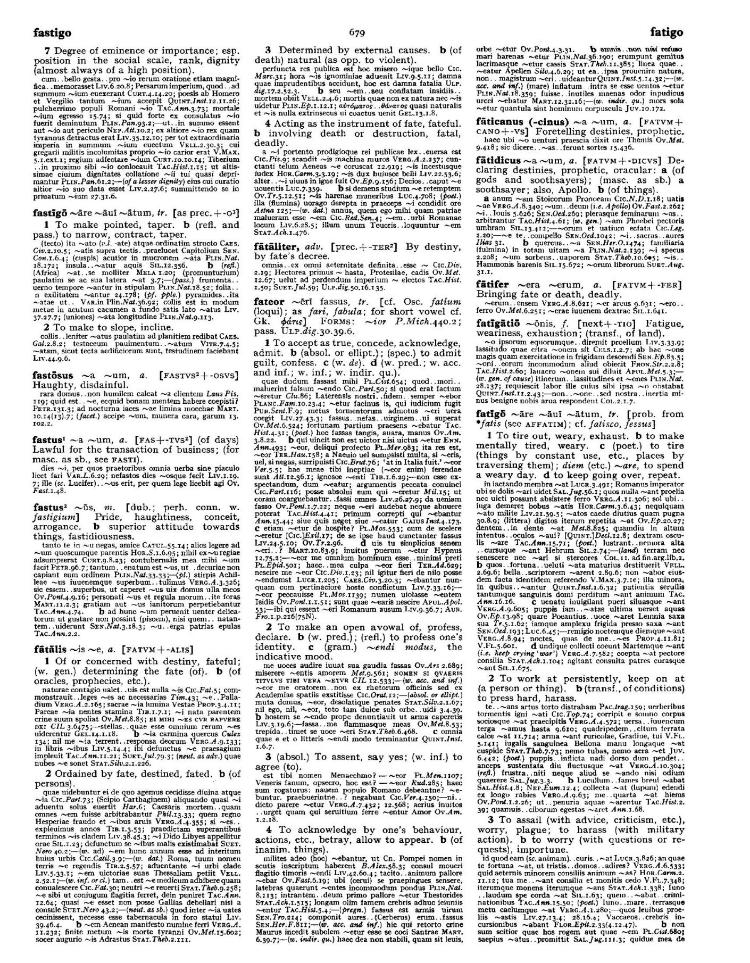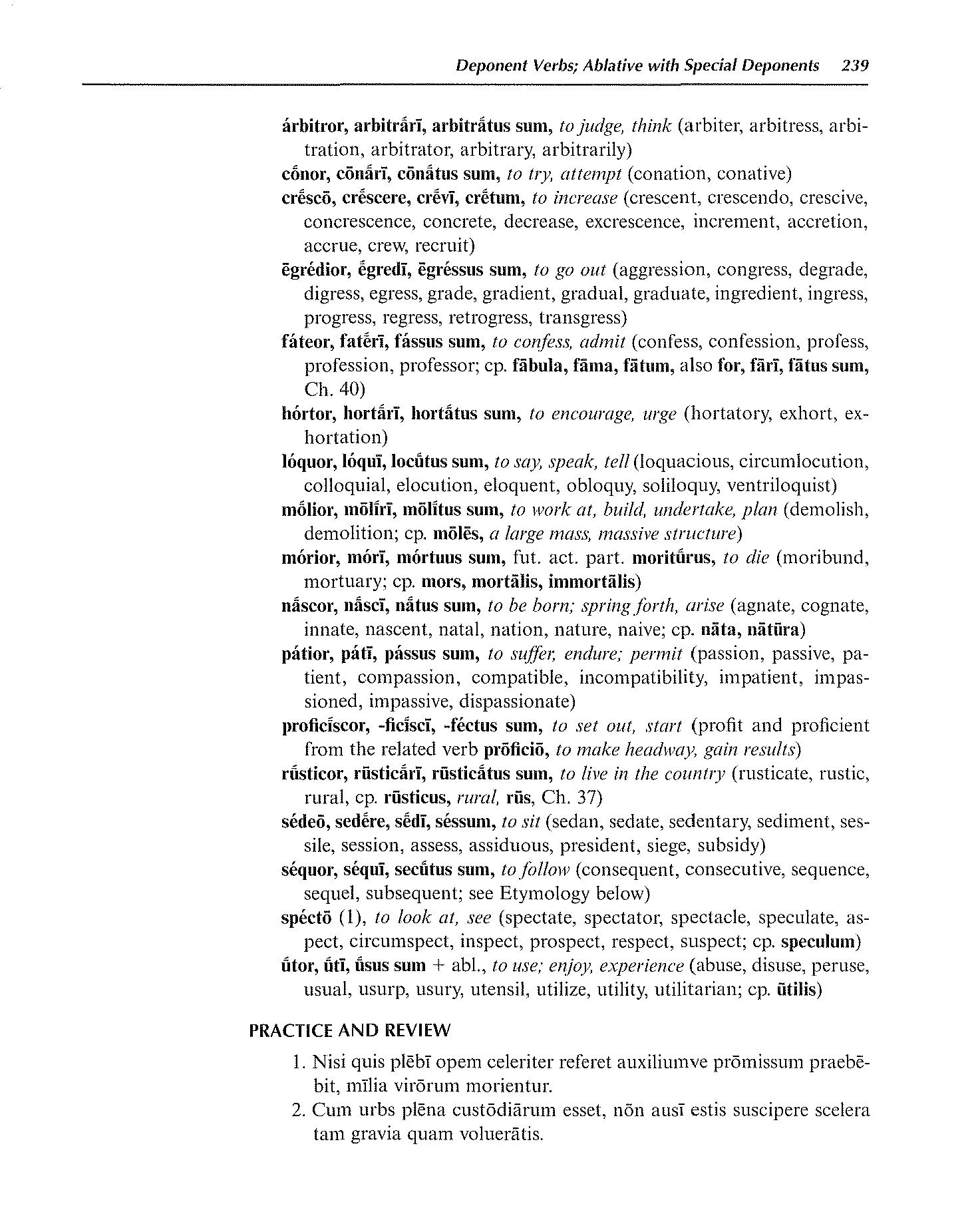
page_listing.tpl
page_subListingDetails.tpl
sub_listingDetails_style1.tpl
sub_listingDetails.title.tpl
fatērī to admit
fatērī is a Latin Verb that primarily means to admit.
Definitions for fatērī
Wheelock's Latin
Verb
- 1
to confess, admit
English derivatives:
confess confession profess profession professor
Oxford Latin Dictionary
Verb
- 1
To accept as true, concede, acknowledge, admit. (b) (absol. or ellipt.); (spec.) to admit guilt, confess. (c) (w. de). (d) (w. pred.; w. acc. and inf.; w. indir. qu.).
- 2
To make an open approval of, profess, declare. (b) (w. pred.); (refl.) to profess one's identity. (c) (gram.) ~endi modus, the indicative mood.
- 3
(absol.) To assent, say yes; (w. inf.) to agree (to).
- 4
To acknowledge by one's behaviour, actions, etc., betray, allow to appear. (b) (of inanim. things).
Sentences with fatērī
Latin to English
Ut saepe fassī sumus, tibi nōn licet Rōmā Athēnās īre.Compare As we have often admitted, you may not (are not permitted to) go from Rome to Athens (lit., to go is not permitted to you).
Fateor, peccavimus, hospes.Compare I have sinned , I confess it, O host.
Acerbus et miser sum, qui fateor ego fortuna noster cogo.Compare It is a bitter and sad thing, which our fortune compels us to confess.
Conjugation table for fatērī
Cactus2000
| ACTIVE | |
| Indicative present | Indicative imperfect |
| fateor fatēris fatētur fatēmur fatēminī fatentur | fatēbar fatēbāris fatēbātur fatēbāmur fatēbāminī fatēbantur |
| Indicative perfect | Indicative pluperfect |
| fassus sum fassus es fassus est fassī sumus fassī estis fassī sunt | fassus eram fassus erās fassus erat fassī erāmus fassī erātis fassī erant |
| Indicative future | Indicative future perfect |
| fatēbor fatēberis fatēbitur fatēbimur fatēbiminī fatēbuntur | fassus erō fassus eris fassus erit fassī erimus fassī eritis fassī erunt |
| Subjunctive present | Subjunctive imperfect |
| fatear fateāris fateātur fateāmur fateāminī fateantur | fatērer fatērēris fatērētur fatērēmur fatērēminī fatērentur |
| Subjunctive perfect | Subjunctive pluperfect |
| fassus sim fassus sīs fassus sit fassī sīmus fassī sītis fassī sint | fassus essem fassus essēs fassus esset fassī essēmus fassī essētis fassī essent |
Infinitive present fatērī Infinitive perfect fassum esse Infinitive future fassūrum esse | Imperative present fatēre fatēminī Imperative future fatēto / fatētor fatēto / fatētor - fatento / fatentor |
| PARTICIPLE | ||
| Participle present active | ||
| fatēns | fatentēs | |
| fatēns | fatentēs | |
| fatēns | fatentēs | |
| fatēns | fatentēs | |
| fatēns | fatentēs | |
| Participle future active | ||
| fassūrus | fassūrī | |
| fassūrus | fassūrī | |
| fassūrus | fassūrī | |
| fassūrus | fassūrī | |
| fassūrus | fassūrī | |
| Participle perfect passive | ||
| fassus | fassī | |
| fassus | fassī | |
| fassus | fassī | |
| fassus | fassī | |
| fassus | fassī | |
| Gerundive | ||
| fatendus | fatendī | |
| fatendus | fatendī | |
| fatendus | fatendī | |
| fatendus | fatendī | |
| fatendus | fatendī | |
| Gerund | Supine | |
| fatērī | fassum | |
| fatērī | fassū | |
| fatērī | ||
| fatērī | ||
| fatērī | ||
| PARTICIPLE | ||
| Participle present active | ||
| Nom. | fatēns | fatentēs |
| Gen. | fatentis | fatentium |
| Dat. | fatentī | fatentibus |
| Acc. | fatentem | fatentēs |
| Abl. | fatente | fatentibus |
| Participle future active | ||
| Nom. | fassūrus | fassūrī |
| Gen. | fassūrī | fassūrōrum |
| Dat. | fassūrō | fassūrīs |
| Acc. | fassūrum | fassūrōs |
| Abl. | fassūrō | fassūrīs |
| Participle perfect passive | ||
| Nom. | fassus | fassī |
| Gen. | fassī | fassōrum |
| Dat. | fassō | fassīs |
| Acc. | fassum | fassōs |
| Abl. | fassō | fassīs |
| Gerundive | ||
| Nom. | fatendus | fatendī |
| Gen. | fatendī | fatendōrum |
| Dat. | fatendō | fatendīs |
| Acc. | fatendum | fatendōs |
| Abl. | fatendō | fatendīs |
| Gerund | Supine | |
| Nom. | fatērī | fassum |
| Gen. | fatendī | fassū |
| Dat. | fatendō | |
| Acc. | fatendum | |
| Abl. | fatendō | |
Data sources
Notes
- Definitions
- Frederick M. Wheelock, Wheelock's Latin, 6th ed., rev. Richard A. LaFleur (New York, NY: HarperCollins Publishers, 2005): 239.
- P. G. W. Glare, Oxford Latin Dictionary, Vols. 1-8 (Oxford: Clarendon Press, 1982): 679.
- Word frequencies
- Christopher Francese, "Latin Core Vocabulary," Dickinson College Commentaries, last modified 2014, http://dcc.dickinson.edu.
- Paul B. Diederich, The Frequency of Latin Words and Their Endings, PhD diss., (Columbia University, 1939).
- Louis Delatte, Suzanne Govaerts, Joseph Denooz, and Etienne Evrard, Dictionnaire fréquentiel et index inverse de la langue latine [Frequency Dictionary and Inverse Index of the Latin Language] (Liège, Belgium: Laboratoire d'analyse statistique des langues anciennes de l'Université de Liège [L.A.S.L.A.], 1981): 125.
Bibliography
Allen, Joseph H. Allen and Greenough's New Latin Grammar for Schools and Colleges: Founded on Comparative Grammar. Edited by James B. Greenough, George L. Kittredge, Albert A. Howard, and Benjamin L. D'Ooge. Boston, MA: Ginn & Company, 1903.
Crystal, David. A Dictionary of Linguistics and Phonetics. 6th ed. Oxford, UK: Blackwell Publishing, 2008.
Delatte, Louis, Suzanne Govaerts, Joseph Denooz, and Etienne Evrard. Dictionnaire fréquentiel et index inverse de la langue latine [Frequency Dictionary and Inverse Index of the Latin Language]. Liège, Belgium: Laboratoire d'analyse statistique des langues anciennes de l'Université de Liège (L.A.S.L.A.), 1981.
Diederich, Paul B. The Frequency of Latin Words and Their Endings. PhD diss., Columbia University, 1939.
Francese, Christopher. "Latin Core Vocabulary." Dickinson College Commentaries. Last modified 2014. http://dcc.dickinson.edu/latin-vocabulary-list.
Gildersleeve, Basil L., and Gonzales Lodge. Gildersleeve's Latin Grammar: Third Edition, Revised, and Enlarged. 3rd ed. London, England: Macmillan and Co., 1903.
Glare, Peter G.W. Oxford Latin Dictionary. Vols. 1-8. Oxford, England: Clarendon Press, 1982.
Krüger, Bernd. "Latin Conjugation Tables." Cactus2000. Accessed May 5, 2023. https://latin.cactus2000.de/index.en.php.
Pierson, Nick. "Sound of Text." Accessed October 26, 2019. https://soundoftext.com.
Wheelock, Frederick M. Wheelock's Latin. 6th ed. Revised by Richard A. LaFleur. New York, NY: HarperCollins Publishers, 2005.
Wiktionary Contributors. "Victionarium." Wikimedia Foundation, Inc. Updated March 18, 2019. https://la.wiktionary.org/wiki/Victionarium:Pagina_prima.
Citation
Chicago (17th ed.)
Allo Contributors. "fateor, fatērī, fassus sum (v.) - Latin Word Definition." Allo Latin Dictionary. Last modified . Accessed February 20, 2026. http://ancientlanguages.org/latin/dictionary/fateor-fateri-fassus-sum.
Entry created on . Last updated on .







